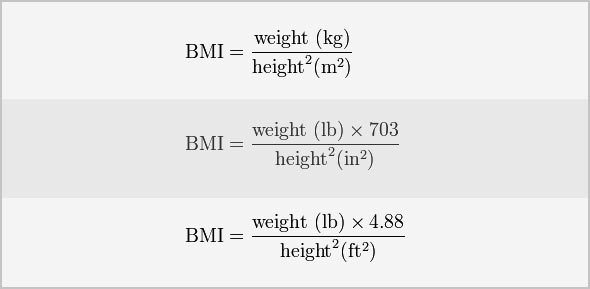BMI: Time to Measure Up.
BMI, or Body Mass Index, is a numerical measurement that is commonly used to assess an individual’s body weight in relation to their height. It provides a quick and easy way to categorize individuals into different weight status categories, helping to identify potential health risks associated with different weight ranges.
Your BMI is a tool, not a verdict. It's a starting point to help you assess your overall health, but it's essential to consider other factors like muscle mass, body composition, and lifestyle habits for a comprehensive understanding of your well-being.
The BMI is calculated using the following formula:

The resulting BMI is then interpreted using the following categories:
- Underweight: BMI less than 18.5
- Normal weight: BMI between 18.5 and 24.9
- Overweight: BMI between 25 and 29.9
- Obese: BMI of 30 or greater

Is it time to measure your BMI?
The frequency with which you should measure your BMI depends on your individual health and fitness goals. In general, it’s not necessary to measure your BMI daily or even weekly. The changes in your body composition may not be significant over short periods, and daily fluctuations can be influenced by various factors such as hydration levels and meal timing.
Here are some general guidelines:
- Regular Check-ins: For most people, checking their BMI every 1 to 3 months is sufficient. This allows enough time for potential changes in weight and body composition to become noticeable.
- As Part of Health Assessments: Consider measuring your BMI as part of a broader health assessment, which may include other metrics like body fat percentage, waist circumference, and fitness levels. This can provide a more comprehensive view of your health.
- During Health or Weight Management Programs: If you’re actively working on health or weight management goals, you might choose to measure your BMI more frequently, such as every 4 to 6 weeks, to track progress.
- Consult with Healthcare Professionals: If you have specific health concerns or are under the guidance of healthcare professionals, they may recommend a more personalized schedule for monitoring your BMI.
It’s important to note that while BMI is a useful screening tool for assessing weight status on a population level, it does not directly measure body fat percentage and may not be a perfect indicator of an individual’s health. For example, a person with a high muscle mass may have a higher BMI without necessarily having excess body fat. Therefore, BMI should be used in conjunction with other health assessments for a more comprehensive evaluation.













Claire Gibson
February 4, 2016 at 9:40 amI found a lot of useful information here, it was a really inspirational read. You discovered many interesting things, it will help me with my workout program.
Thomas Bradley
February 4, 2016 at 9:43 amThank you so much, I really appreciate it. The main focus is on the importance of healthy diet and exercise. I am glad you find it interesting.
Bianca Reid
February 4, 2016 at 9:45 amReally inspirational read, thank you! I was just looking for a diet plan that suits my busy lifestyle and this seems like a way to go. I will try it for sure.